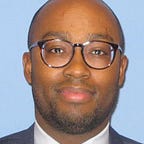Machine Learning as a CAMS Attorney
Your whole life changes when you become a father; and now that I have become one, I can attest that is more than just a cliché phrase.
Sitting on my lap, exists a tiny human being with fifty percent of me, watching my every move, using his instincts and learning through observation. We are learning from each other, recognizing patterns and gaining daily experiences. It becomes a game, making a face and sticking my tongue out elicits a similar response.
Now I notice the habits that the baby has and wonder whether this is just instincts or something that he has learned from observation. The artificial intelligence community defines the process of learning through experiences as machine learning. White collar litigation elicits similar learning patterns, pulling from specialized education like a Certified Anti-Money Laundering Specialist (“CAMS”) certification to daily experiences as a litigator.
White collar litigation requires a library of skills, one of them being the constant objective of recognizing patterns within facts and numbers. Yes, there are services that assist in this objective, but the fun is getting your hands dirty and bringing those patterns to life. White collar litigation lives within the numbers, the ink on the bank statements, the receipts and wire transfers. It also lives within the stories that the numbers tell and numbers do not always tell the same story. It could be a story of greed, social acceptance, a desire to be great, or an unquenchable thirst for more.
My period of burgeoned growth occurred when I was assigned to a newly created team within my office and worked alongside a team leader, who soon after, became a judge in New Jersey. It was not an assignment that I wanted and, to be honest, I always thought my team leader deserved a more fitting role within the office that properly represented her experience and accomplishments. Nonetheless, she guided the unit through uncharted territory flawlessly. I would not be in this position of my career without her ongoing mentorship.
Under her supervision, I learned how to bring the innocuous facts to life through a mixture of observing her on her feet (court lingo for arguing in front of a judge), and hours of positive criticism and investigation oversight. The most important lessons came from observing her tactful interactions with other defense attorneys and judges. I transferred those same lessons to my financial crimes investigations.
All of the teachings are still fresh in my mind. When I told her about my desire to break into white collar litigation and obtain a CAMS certification, she encouraged me take the course and helped me understand how I could apply these new skills to my current position. The common theme behind each learning opportunity was to identify my own style and analyze every fact in a case. The difference between a good litigator and a great litigator is the attention to detail. In the courtroom, the culmination of these learning experiences came to life, and soon, I was incorporating them in my own court appearances and investigations.
In a violent crime investigation, it was parsing out the fact that a shooting which occurred during a time when school was in session further demonstrated the risk to not only the intended victim but also innocent bystanders. The application holds a similar thread when applied in a financial crimes investigation. Highlighting the pattern of fraudulent deposits in a check cashing scheme further cemented the identity of the participants and their conspiracy. In an account takeover investigation, value exceeding $500,000.00, it was quickly recognizing the type of crime and tracing the money flow, while avoiding being inundated by the voluminous financial documents.
The studying process for the CAMS certification presented its own obstacles. For starters, I had to teach myself the new material and re-familiarize myself with some of the topics that touched upon previous law school courses; but as the weeks passed, and my legal acumen grew, being able to apply the material to my investigations proved priceless.
Understanding the science is key to lighting paper cases on fire, in a good way. There is a story within each case and it is usually more than just about the money. There is a human aspect, but understanding the science of financial crime is imperative to making sure you have the tools necessary to illustrate the full picture. Going from scientist to orator is what will set you apart and really gain the jury’s trust. Those are the skills an attorney is able to obtain with the assistance of a CAMS certification.
Leveraging these skills in any situation requires constant tinkering, daily upskilling, and practice. Noticing patterns is vital. Getting CAMS certified is the tinder needed to keep the fire going.
